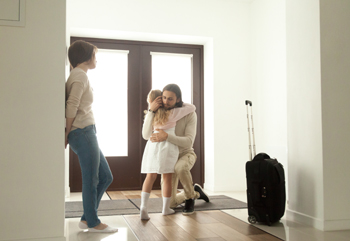Obviously, one of the most sensitive issues during a divorce is the child custody  arrangements. You have heard the words “sole custody” and “shared custody”. Do you know the difference? It is helpful to understand the terminology.
arrangements. You have heard the words “sole custody” and “shared custody”. Do you know the difference? It is helpful to understand the terminology.
Two Types of Custody: Legal and Physical
It’s important to remember that there are two distinct types of custody: legal and physical.
Legal custody refers to a parent’s right to make decisions on behalf of their child and have access to their child’s private information. For example, a parent with legal custody of a child would have the right to make decisions about healthcare and education.
Physical custody refers to a parent’s right to be present in their child’s life and have their child live with them. For example, a parent with physical custody of a child would have the right to have their child live in their home.
Custody decisions must reflect a parent’s legal and physical custodial rights. Both of these rights can be sole or shared.
Courts prefer for children to remain in regular contact with both parents after a divorce. It’s believed that maintaining relationships with both parents will be in the child’s best interest and provide them with the stability and normalcy they need after a divorce. The best way to achieve this is by awarding parents shared legal and physical custody of a child.
Shared custody means precisely what it says. Both parents are awarded the right (a) to make decisions for their child and (b) be present in their child’s life. In shared custody arrangements, parents have to be willing to compromise and work together to do what’s best for a child.
Do Parents Have Equal Rights in Shared Custody Arrangements?
Not necessarily. Joint custody arrangements do not have to award parents equal rights. Joint, or shared, custody simply means that both parents are awarded some degree of rights and responsibility in regard to their kids. However, it is often preferable to grant rights that are as equitable as possible in joint custody situations.
Legal Custody: In shared custodial arrangements, it’s fairly simple to award parents equal legal custodial rights of a child. Neither parent has the “final” say when there are disputes over decisions that affect a child’s health, education, or well being. Instead, both parents get an equal say. If disputes can’t be resolved, courts can step in and make a unilateral decision.
Physical Custody: In shared custodial arrangements, it can be difficult to divide physical custody equally between two parents. It’s simply a logistical nightmare. As a result, one parent often gets to spend a little bit more time with the child than the other. In other situations, one parent spends significantly more time with the child than the other. However, both parents continue to share the right to have their child live with them in their home for at least some period of time during the year. The parent who spends more time with the child is often referred to as the primary custodial parent.
Sole Custody Sometimes Necessary to Protect a Child’s Best Interests
Courts will always encourage parents to find a way to make a shared custody plan work. However, there are times when allowing both parents to share legal and physical custody is not in the child’s best interest. This happens when there is evidence to suggest that a parent would not be physically, emotionally, or psychologically fit to take care of their child.
Sole custody may be preferable when one parent:
•Is addicted to drugs or alcohol
•Suffers from a mental or physical disability
•Has a history of domestic abuse
•Travels frequently and can’t provide a steady home for the child
•Is visibly absent from the child’s life.
Sole custody can also be useful when two parents do not live near one another after a divorce. For example, a shared physical custody arrangement wouldn’t work too well if one parent remained in Los Angeles, but the other moved to New York. It wouldn’t be fair to the child to require them to live half of their life in one state and half of their life in another.
Ty Zdravko practices law as a divorce attorney, and family law attorney in Palm Harbor, Clearwater and the surrounding area.
For more information, visit our website at www.divorceboardcertified.com
or call (727) 787-5919.
